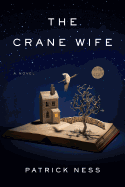
Affability has long been George Duncan's undoing. At 48, the hero of Patrick Ness's quiet miracle of a novel has learned to lower his expectations. His solitude is punctuated by undemanding days at his print shop and by visits from his fiery daughter, Amanda, and four-year-old grandson. But George knows that he needs something more; he needs to offer something more to the world. As for love, women can't see him as more than a friend.
This, though, is the daytime George. When we first meet him, it is the dead of night. Awakened by an uncanny, desperate cry, he finds a giant white crane in his garden. The odds of such a visitation in suburban London: nonexistent. But when George accepts that he's not dreaming, he realizes that the bird is dreadfully injured, one wing shot through with an arrow, and now close to death.
As in the Japanese folktale that inspired Ness's novel, to reveal that the man at last manages to remove the weapon is not a spoiler. This is the beginning, not the end, of George's odyssey--and the crane's, who will reappear in human guise as an artist named Kumiko.
Ness has a playwright's flair for witty repartee and the gift of letting us inside his characters, where we follow them with sympathy and clarity. A very modern fable about making sense of the world and the stories we tell ourselves, his artful exploration of generosity and greed, creation and destruction, dreams and practical magic will leave you transported by what W.B. Yeats called tragic joy. --Kerry Fried

